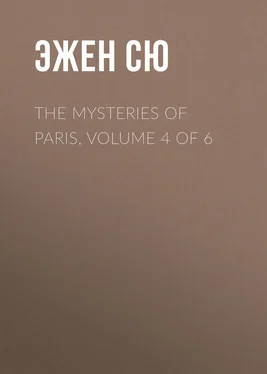Эжен Сю - The Mysteries of Paris, Volume 4 of 6
Здесь есть возможность читать онлайн «Эжен Сю - The Mysteries of Paris, Volume 4 of 6» — ознакомительный отрывок электронной книги совершенно бесплатно, а после прочтения отрывка купить полную версию. В некоторых случаях можно слушать аудио, скачать через торрент в формате fb2 и присутствует краткое содержание. Жанр: literature_19, foreign_antique, foreign_prose, на английском языке. Описание произведения, (предисловие) а так же отзывы посетителей доступны на портале библиотеки ЛибКат.
- Название:The Mysteries of Paris, Volume 4 of 6
- Автор:
- Жанр:
- Год:неизвестен
- ISBN:нет данных
- Рейтинг книги:5 / 5. Голосов: 1
-
Избранное:Добавить в избранное
- Отзывы:
-
Ваша оценка:
- 100
- 1
- 2
- 3
- 4
- 5
The Mysteries of Paris, Volume 4 of 6: краткое содержание, описание и аннотация
Предлагаем к чтению аннотацию, описание, краткое содержание или предисловие (зависит от того, что написал сам автор книги «The Mysteries of Paris, Volume 4 of 6»). Если вы не нашли необходимую информацию о книге — напишите в комментариях, мы постараемся отыскать её.
The Mysteries of Paris, Volume 4 of 6 — читать онлайн ознакомительный отрывок
Ниже представлен текст книги, разбитый по страницам. Система сохранения места последней прочитанной страницы, позволяет с удобством читать онлайн бесплатно книгу «The Mysteries of Paris, Volume 4 of 6», без необходимости каждый раз заново искать на чём Вы остановились. Поставьте закладку, и сможете в любой момент перейти на страницу, на которой закончили чтение.
Интервал:
Закладка:
"It is, neighbour; and I assure you I will not forget the engagement. But you refuse me this to-day?"
"Yes, M. Rodolph. I should be a very dull companion, without saying a word about the time it would occupy me; for, you see, at this moment, I really cannot afford to be idle, or waste one single quarter of an hour."
"Then, for to-day I renounce the pleasure."
"There is my parcel, neighbour. Now go out first, and I will lock the door."
"Here's a capital pen for you; and now for the parcel."
"Mind you don't rumple it; it is pout-de-soie , and soon creases. Hold it in your hand, – carefully, – there, in that way; that's it. Now go, and I will show you a light."
And Rodolph descended the staircase, followed by Rigolette.
At the moment when the two neighbours were passing by the door of the porter's lodge they saw M. Pipelet, who, with his arms hanging down, was advancing towards them from the bottom of the passage, holding in one hand the sign which announced his Partnership of Friendship with Cabrion, and in the other the portrait of the confounded painter. Alfred's despair was so overwhelming that his chin touched his breast, so that the wide crown of his bell-shaped hat was easily seen. Seeing him thus, with his head lowered, coming towards Rodolph and Rigolette, he might have been compared to a ram, or a brave Breton, preparing for combat.
Anastasie soon appeared on the threshold of the lodge, and exclaimed, at her husband's appearance:
"Well, dearest old boy, here you are! And what did the commissary say to you? Alfred, Alfred, mind what you're doing, or you'll poke your head against my king of lodgers. Excuse him, M. Rodolph. It is that vagabond of a Cabrion, who uses him worse and worse. He'll certainly turn my dear old darling into a donkey! Alfred, love, speak to me!"
At this voice, so dear to his heart, M. Pipelet raised his head. His features were impressed with a bitter agony.
"What did the commissary say to you?" inquired Anastasie.
"Anastasie, we must collect the few things we possess, embrace our friends, pack up our trunk, and expatriate ourselves from Paris, – from France, – from my beautiful France; for now, assured of impunity, the monster is capable of pursuing me everywhere, throughout the length and breadth of the departments of the kingdom."
"What, the commissary?"
"The commissary," exclaimed M. Pipelet, with fierce indignation, – "the commissary laughed in my teeth!"
"At you, – a man of mature age, with an air so respectable that you would appear as silly as a goose if one did not know your virtues?"
"Well, notwithstanding that, when I had respectfully deposed in his presence my mass of complaints and vexations against that infernal Cabrion, the magistrate, after having looked and laughed – yes, laughed, and, I may add, laughed indecorously – at the sign and the portrait which I brought with me as corroborative testimony, – the magistrate replied, 'My good fellow, this Cabrion is a wag, – a practical joker. But pay no attention to his pleasantries. I advise you to laugh at him, and heartily, too, for really there is ample cause to do so.' 'To laugh at it, sir-r-r!' I exclaimed, – 'to laugh at it, when grief consumes me, – when this scamp poisons my very existence; he placards me, and will drive me out of my wits. I demand that they imprison, exile the monster, – at least from my street!' At these words the commissary smiled, and politely pointed to the door. I understood the magistrate, sighed, and – and – here I am!"
"Good-for-nothing magistrate!" exclaimed Madame Pipelet.
"It is all over, Anastasie, – all is ended, – hope ceases. There's no justice in France; I am really atrociously sacrificed."
And, by way of peroration, M. Pipelet dashed the sign and portrait to the farther end of the passage with all his force. Rodolph and Rigolette had in the shade smiled at M. Pipelet's despair. After having said a few words of consolation to Alfred, whom Anastasie was trying to calm as well as she could, the king of lodgers left the house in the Rue du Temple with Rigolette, and they both got into a coach to go to François Germain's.
CHAPTER II
THE WILL
François Germain resided No. 11 Boulevard St. Denis. It may not be amiss to recall to the reader, who has probably forgotten the circumstance, that Madame Mathieu, the diamond-matcher, whose name has been already mentioned as the person for whom Morel the lapidary worked, lodged in the same house as Germain. During the long ride from the Rue du Temple to the Rue St. Honoré, where dwelt the dressmaker for whom Rigolette worked, Rodolph had ample opportunities of more fully appreciating the fine natural disposition of his companion. Like all instinctively noble and devoted characters, she appeared utterly unconscious of the delicacy and generosity of her conduct, all she said and did seeming to her as the most simple and matter-of-course thing possible.
Nothing would have been more easy than for Rodolph to provide liberally both for Rigolette's present and future wants, and thus to have enabled her to carry her consoling attentions to Louise and Germain, without grieving over the loss of that time which was necessarily taken from her work, – her sole dependence; but the prince was unwilling to diminish the value of the grisette's devotion by removing all the difficulties, and, although firmly resolved to bestow a rich reward on the rare and beautiful qualities he hourly discovered in her, he determined to follow her to the termination of this new and interesting trial. It is scarcely necessary to say that, had the health of the young girl appeared to suffer in the smallest degree from the increase of labour she so courageously imposed on herself, in order to dedicate a portion of each week to the unhappy daughter of the lapidary and the son of the Schoolmaster, Rodolph would instantaneously have stepped forward to her aid; and he continued to study with equal pleasure and emotion the workings of a nature so naturally disposed to view everything on its sunny side, so full of internal happiness, and so little accustomed to sorrow that occasionally she would smile, and seem the mirthful creature nature had made her, spite of all the grief by which she was surrounded.
At the end of about an hour, the fiacre , returning from the Rue St. Honoré, stopped before a modest, unpretending sort of house, situated No. 11 Boulevard St. Denis. Rodolph assisted Rigolette to alight. The young sempstress then proceeded to the porter's lodge, where she communicated Germain's intentions, without forgetting the promised gratuity.
Owing to the extreme amenity of his disposition, the son of the Schoolmaster was unusually beloved, and the confrère of M. Pipelet was deeply grieved to learn that so quiet and well-conducted a lodger was about to quit the house, and to that purpose the worthy porter warmly expressed himself. Having obtained a light, Rigolette proceeded to rejoin her companion, having first arranged with the porter that he should not follow her up-stairs till a time she indicated should have elapsed, and then merely to receive his final orders. The chamber occupied by Germain was situated on the fourth floor. When they reached the door, Rigolette handed the key to Rodolph, saying:
"Here, will you open the door? My hand trembles so violently, I cannot do it. I fear you will laugh at me. But, when I think that poor Germain will never more enter this room, I seem as though I were about to pass the threshold of a chamber of death."
"Come, come, my good neighbour, try and exert yourself; you must not indulge such thoughts as these."
"I know it is wrong; but, indeed, I cannot help it." And here Rigolette tried to dry up the tears with which her eyes were filled.
Читать дальшеИнтервал:
Закладка:
Похожие книги на «The Mysteries of Paris, Volume 4 of 6»
Представляем Вашему вниманию похожие книги на «The Mysteries of Paris, Volume 4 of 6» списком для выбора. Мы отобрали схожую по названию и смыслу литературу в надежде предоставить читателям больше вариантов отыскать новые, интересные, ещё непрочитанные произведения.
Обсуждение, отзывы о книге «The Mysteries of Paris, Volume 4 of 6» и просто собственные мнения читателей. Оставьте ваши комментарии, напишите, что Вы думаете о произведении, его смысле или главных героях. Укажите что конкретно понравилось, а что нет, и почему Вы так считаете.












